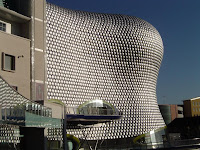Well, it is.
Really.
This city has some strikingly beautiful spots interspersed by large areas of heavy red-brick industrial-era buildings and separated by poor ghettos of dense housing or shopping strips.

Much of the older architecture gives the city a heavy and cloistered feel. Buildings are spaced close together on a flat landscape to produce a city with limited views. The canals are closed in and hidden behind walls, so it is nigh impossible to enjoy the canal from any vantage point. There are few trees to add colour to the red and grey buildings. Criticising the hasty post-war development that many now lament, a local reporter once said, "What the Luftwaffe began, arrogant, philistine town planners finished off."


Originally developed during pre-automobile times, roads are narrow, with many only one-way. Parking spaces are non-existent. I must say that, despite my usual geographical ability to know my way around, the streets of Birmingham have beat me, and I get lost too frequently.
As with any city, there is a tension between preserving the historical features of the city and clearing enough space to develop new projects. The Parisians cleared wide boulevards in the 19th century, and the same was done to sections of Rome during Mussolini's tenure. Despite the upheaval, both cities are the better for it. But an opportunity was lost during the rebuilding of Birmingham following the devastating blitz.

The local council is determined to transform the city into a modern, vibrant international city of which locals can be proud. Development of the city's famous Bull Ring shopping centre has been widely acclaimed; balancing a modern centre around the old church at its heart. And the new space-aged Selfridges is a sign of confidence in the future.

Brindley Place was a wonderful discovery found last week when we went for a canal boat trip. It is a magnet for those in search of a meal or after-work drink.
The magnificent, modern Symphony Hall is the legacy of the world-renowned conductor, Simon Rattle. It is a concert hall designed from the inside-out, with acoustical integrity as a top priority in its initial design brief. Rattle, Elgar and Gustav Holst all have links to this city. JRR Tolkein is another favoured son.


These new developments give this city some hope. Birmingham has aimed to shake off its industrial past and become a city of culture. Concerts, theatre, ballet, music festivals and other arts promotions are regularly held to transform not just the architecture, but the attitude of the locals.

So, last weekend was our cultural time in Birmingham, beginning with the Birmingham Symphony orchestra concert on Friday evening. On Saturday we visited the art gallery, toured the canals by boat and attended the flautist James Galway's wonderful 70th birthday recital celebrating a professional career that began here. Not to let up the pace, a Sunday trip to beautiful (and sunny) Stratford-upon-Avon was taken to immerse ourselves in Shakespeare's birthplace and homeland.

Birmingham has made the final short-list of four cities competing for the UK City of Culture, and is inviting local residents to participate in this bid. A win would give it the respect it craves, and perhaps deserves.











